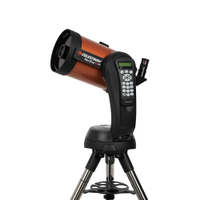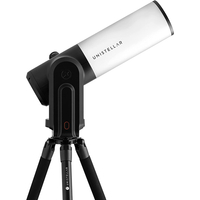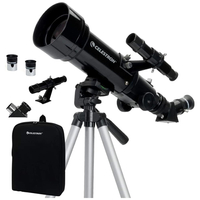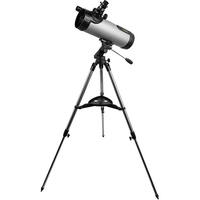Telescopes at Best Buy: Deals in stock 2024
Searching for telescopes at Best Buy can be a good way to bag a bargain on your next model, we've rounded up the top discounts below.
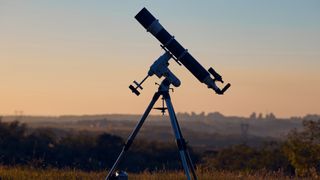
Scoping out telescopes at Best Buy is a sensible option if you're looking for a stargazing deal as the retailer is a major and reputable one.
Best Buy stocks some of the best telescopes on the market and fortunately, you can find some good telescope deals there too. Stand-out deals can sometimes be a little thin on the ground but our guide includes something suitable for all astronomers, irrespective of budget, experience and viewing needs. We've also included some helpful buying advice, which you can find below the discounts.
Not ready for a telescope? Read our best binoculars guide More top deals: Telescopes on Amazon See the latest discounts: Telescopes at Walmart
On top of retailer-specific guides like this one, we also have manufacturer-specific guides, in case there's a name you particularly trust. Check out our round-ups of Celestron, Sky-Watcher, Meade and Orion telescope deals for more top deals that you may not find below.
This page is updated throughout the year and if new deals for telescopes at Best Buy appear, we'll add them below. If you're trying your hand at astronomy or looking to inspire a budding stargazer, it could be worth scrolling through our guides for budget telescopes for under $500, best telescopes for beginners and best telescopes for kids. But, if you want the best telescopes at Best Buy and their discounts, read on below.
Best telescope deals at Best Buy April 2024
Celestron NextStar 6SE Computerized telescope Was $1099 Now $999.99.
Save $99 on a high-quality, no-nonsense computerized telescope that offers stunning views and is well suited to those who want a hassle-free stargazing experience. Check out our full Celestron NexStar 6SE review, we rate it very highly.
Unistellar eVscope 2 Was $5199.99 now $4899.99.
Save $300 on a premium telescope designed for those who are serious about astronomy. It features a stunning design, a Nikon eyepiece, and the app it works in conjunction with means it's simple to use. Check out our full Unistellar eVscope 2 review for a closer look.
Note: The saving is decent but the price to pay is standard for this telescope.
Celestron Travel Scope 70 was $109.95 now $99.99.
Save $10 on a telescope that features fully coated glass optics, a 70mm aperture, a 400mm focal length, correctly oriented views and a backpack for you to transport your telescope with ease. It's better suited for viewing stars and for those without much previous astronomy experience.
National Geographic 114mm Reflector Telescope With Astronomy App was $199.99 now $179.99.
Save $20 on a reflector telescope from National Geographic that features a 114mm aperture and a 500mm focal length. You also get two eyepieces, panhandle control, a smartphone adaptor, a full-sized tripod, a red dot viewfinder and downloadable astronomy software for your money.
Buying advice
There are three basic types of telescopes: refractors, reflectors and catadioptrics. Refractors are great for highly magnified views of planets and moons, while reflectors offer better views of deep-sky objects, star clusters and galaxies. Catadioptric telescopes correct some of the visual problems found in these older styles – such as chromatic aberration – but they tend to be a little more expensive.
Reflectors
Reflectors are usually either Newtonian or Dobsonian in design. Newtonian telescopes are good for a wide range of viewing targets and are often useful for astrophotography – however, they require a lot of maintenance and can be complicated to set up, whereas Dobsonians are more straightforward.
Refractors
This type of telescope is ideal for beginners, offering a straight-forward assembly and a lower price point. They do, however, tend to suffer from chromatic aberration, where bright objects appear to have a kind of halo. This doesn't ruin the viewing experience, so don't let this put you off too much.
Catadioptric
Catadioptric telescopes fall into two broad categories: Maksutov-Cassegrain and Schmidt-Cassegrain. Schmidt-Cassegrains traditionally have bigger apertures, while Maksutov-Cassegrains usually have small apertures. As such, the Schmidt-Cassegrain is usually better for astrophotography and for broader views, while the Maksutov-Cassegrain is great for sharp views of planets and moons. Both types often come with a computerized GoTo system, which can work out which way the telescope is pointing and automatically adjust it to align with chosen targets.
Choosing a telescope
With all these variations, it can be tricky to figure out which telescope is best for you. We recommend taking two main things into consideration: personal budget and what you’d prefer to view in the night sky.
Lower budget models will usually be reflector or refractor telescopes, while catadioptrics are more expensive. If you’d prefer high magnification views of planets and moons, go for either a refractor or a Maksutov-Cassegrain design. For views of deep-sky objects, star clusters and galaxies, opt for a reflector or a Schmidt-Cassegrain telescope. And if you need more detailed guidance, have a look through our piece on the best telescopes, which goes into more detail on all of the above.
Join our Space Forums to keep talking space on the latest missions, night sky and more! And if you have a news tip, correction or comment, let us know at: community@space.com.
Get the Space.com Newsletter
Breaking space news, the latest updates on rocket launches, skywatching events and more!
Ruth has worked across both print and online media for five years, contributing to national newspaper titles and popular tech sites. She has held a number of journalist roles alongside more senior editorial positions, and was formerly acting as a commissioning editor for Space.com until 2022.
- Alexander CoxE-commerce Staff Writer
